You may not know this, but if you wrote a (really terrible) book about Virginia Tech's football history against Duke, you'd probably have to divide it into two parts: Part I: 1937 - 1951 and Part II: 1969 - Present.
For the sake of good literature please don't write this book, but consider that Part I would consist of the Hokies going 0-6 and getting outscored 19-207. Anyone weird enough to keep reading would then see Part II deliver VT a 13-2 record and outscore the Blue Devils 453-171. Of course, the final chapter is a 10-13 home loss with a 387-198 yardage advantage capsized by four critical turnovers. That Duke also had four turnovers is made irrelevant by the final score.
The question on Hokie minds this week is whether, given a few more years, the 2013 contest would be grouped in a Part III about returned Duke dominance or just another blip in an increasingly lengthy Part II.
Let's try to answer that by starting with the computer rankings for each team:
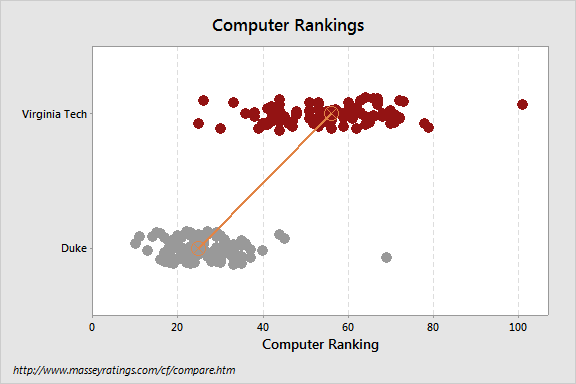
A friendly reminder that the maroon dots represent the Virginia Tech rankings, while grey represents Duke's. Please, take a moment.
Since there is near universal agreement by the predicting computers that Duke is the better team, the predictions should come as no surprise:

The odds of a 5.5-point underdog winning are 35.2%.
Next is a look at any overall offensive or defensive advantages before drafting the opening to Part III of the book:
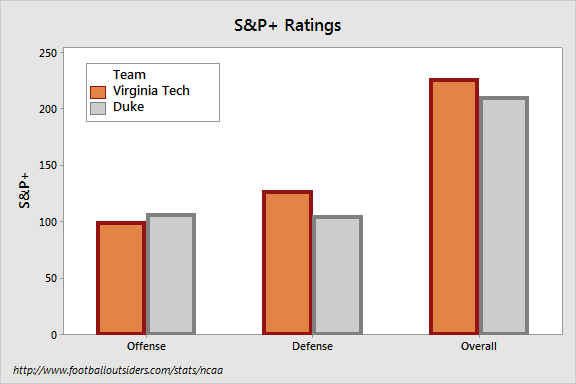
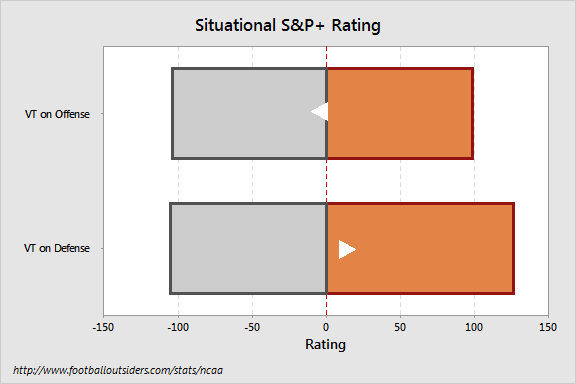
This is an interesting situation likely not previously seen in By the (Advanced) Numbers: S&P+ disagrees with the other computers. Although not all publish their methods, the standard for computer rankings typically utilizes either win-loss data or score data to rate teams; conversely, S&P+ and FEI use play-by-play data and are able to remove much more luck components to gain a better picture of who "won" between two teams. It would seem then that Duke's results thus far are likely not particularly representative of their ability to move the ball and stop the other team from doing so. In fact, on a neutral field S&P+ believes the Hokies are the better team.
Better hold off on Part III for now...
When Virginia Tech Has the Ball
Here is an explanation of S&P+ ratings, and FEI ratings. All statistics are now opponent-adjusted.
Who has the advantage in the passing and rushing game when the Tech offense has the ball?
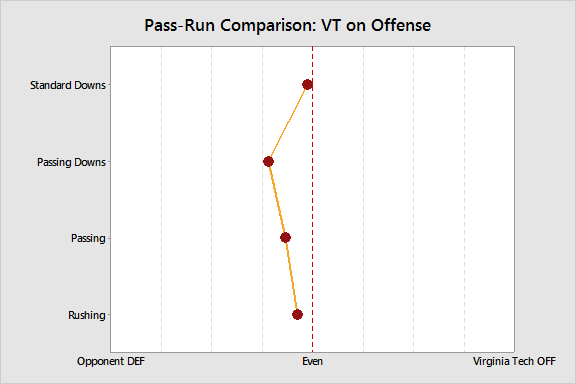
While fans might be used to opposing defenses having the advantage, things are fairly close in this game and traditionalists will take solace in the Hokie rushing game being at a slight advantage to the passing game.
Now let's take a look at the FEI personality traits of the Hokie offense versus the Blue Devil defense.
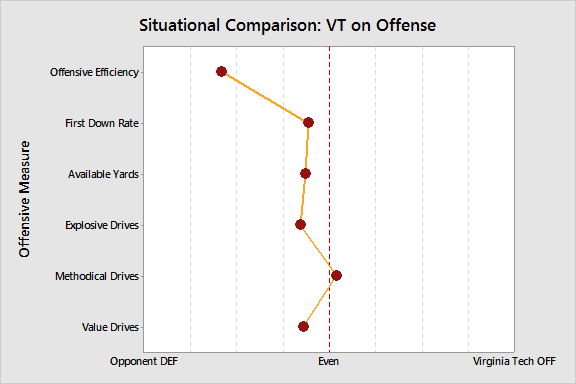
Think of efficiency a bit like yards per play adjusted for opponent. Virginia Tech's offense is not very good at that, and it's sort of an important part of playing football. But hey, methodical drives!
The No. 89 Virginia Tech offense is closest in personality to:
- Kent State
- Hawai'i
- Penn State
The No. 13 Duke defense is closest in personality to:
- Washington
- Oklahoma
- Northwestern
When Duke Has the Ball
Again, examine pass-run comparisons first:
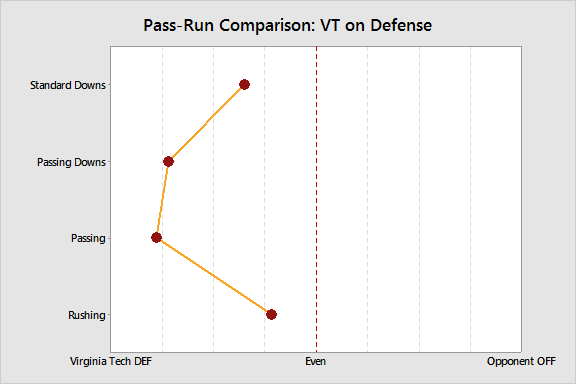
The big plays might sting, but Bud Foster has put together an elite pass defense, and despite disappointing point totals he has faced 5 of the top 25 F+ offenses in college football already. Duke will be the lowest-rated FBS offense played yet besides Western Michigan, who is rated four spots behind them. Wake Forest and Virginia are easily the two worst. Injuries aside, we may witness some real defensive dominance down the stretch.
As for personality traits:

With the exception of explosive drives, VT enjoys slight advantages across the board and a modest one on efficiency.
The No. 3 Virginia Tech defense is closest in personality to:
- Michigan State
- Arkansas State
- Air Force
The No. 37 Duke offense is closest in personality to:
- LA-Lafayette
- Central Michigan
- Arizona State
Special Teams
First we look at the Hokie's kicking units:
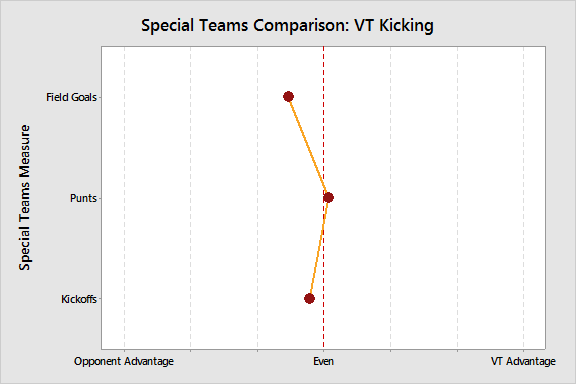
Used to bigger Tech advantages? Duke has the No. 1 special teams unit in the nation. But VT is still better at punting than the Blue Devils are at returning. When Duke kicks:
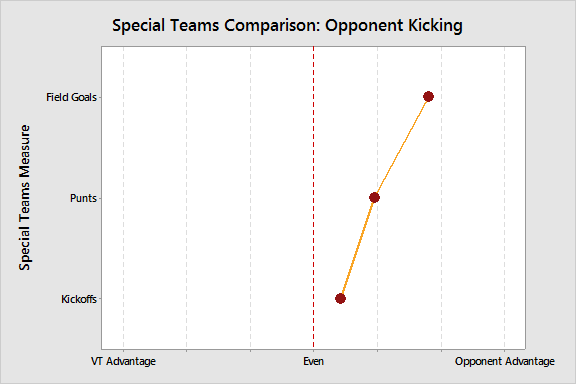
As bad as Tech is at returning kicks, kicking off is clearly Duke's weakest unit. Rather than risk injury it may be worth just giving the Blue Devils 3 points when they attempt a field goal.
Who To Watch Out For
- Freshman RB Shaun Wilson averages 9.22 YPC, 2nd in the nation. (Note to self: keep in preview and change "Freshman" to "Sophomore" next year)
- Senior LB David Helton averages over 10 tackles per game
Missing Anthony Boone? He is still the QB but has a QB rating lower than Michael Brewer this season.
Statistical Key to the Game
One area where Duke is at a disadvantage against VT is on third- or fourth-and-short where the Hokie defensive line has had much more success in stopping the first down (24th) than the Blue Devils have had at making them (87th). Keep Duke under 60% and win the game.
My Prediction
Let's not write Part III just yet. While it would be hard to believe we're still dominant against Duke, no one can claim the opposite yet either. Maybe Part III is a period of parity, or maybe we're in a two-year blip, Cutliffe bolts after the season, and Duke returns to cellar-dweller status.
I think the defense looks much less vulnerable than we've seen and we're looking at a low-scoring affair but ultimately win and do so in a way that gives us hope for the last two regular-season games.
Virginia Tech 17, Duke 14
As always a thanks to Football Outsiders, cfbstats.com, and Minitab Statistical Software.

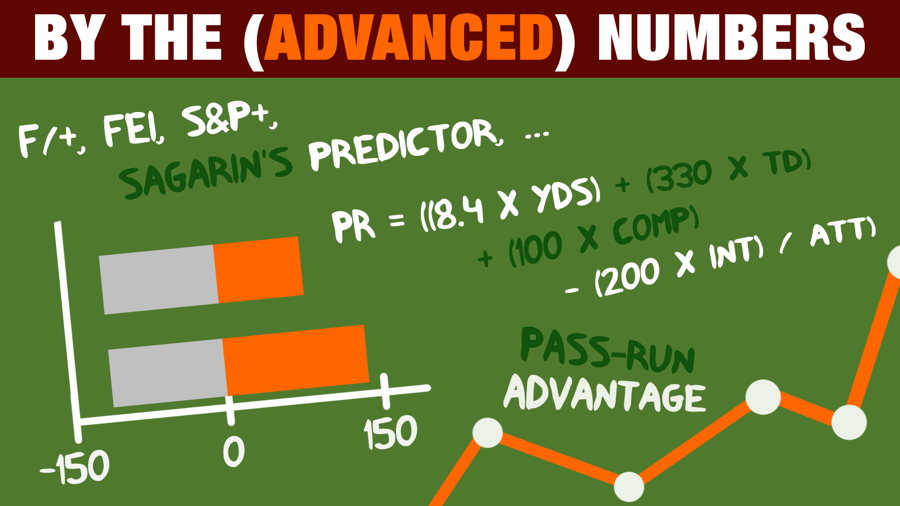
Comments
Please join The Key Players Club to read or post comments.
Please join The Key Players Club to read or post comments.
Please join The Key Players Club to read or post comments.
Please join The Key Players Club to read or post comments.
Please join The Key Players Club to read or post comments.
Please join The Key Players Club to read or post comments.
Please join The Key Players Club to read or post comments.
Please join The Key Players Club to read or post comments.
Please join The Key Players Club to read or post comments.
Please join The Key Players Club to read or post comments.